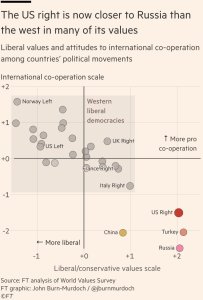Pointing out that hypocrisy has become the standard of all political discourse rather than addressing substantive content. Great post from Jamie Bartlett earlier today:
(And actually a good thread of comments reinforcing the point that “taking sides” against opponents is generally destroying all political decision-making nuance.)
In fact as I frequently point out (after Brunsson) hypocrisy is an essential political skill – being able to hold conflicting positions in different contexts over different times. Anyone who can’t is a simpleton and shouldn’t be allowed near a difficult decision.
The rest of this post is just a dump of thoughts I really can’t be bothered to append to every social-media post or response.
So much in the opening COP26 speeches by national premiers and treasures “out-rhetoricking” each other in how close to midnight / extinction / crisis / emergency / rebellion / time-bomb / now-or-never / last-chance we are on climate change. It just ramps up the political stakes – rallies “troops” – without adding anything to any solutions. Indeed it simply leaves more meaningless hostages-to-fortune lying around for hypocritical hypocrites to pick over next time round. All it does it make future rational action much harder and in the meantime increases the risk of taking dumb counter-productive actions because they are populist vote-catchers.
And in a similar vein from Tom Chivers too:
Some specifics:
The new Workington coal mine? How can the UK claim climate leadership whilst building a new coal-mine. Quite simple really:
And now after commitments to net-zero carbon-equivalent footprints and fossil-fuel usage, driven by global-warming calculations we have a methane commitment. We keep setting targets based on simple single numbers. Tunnel vision on a few easy tangibles, ignoring the ecosystem as a whole:
Teli Chinelis (on LinkedIn)
“Once again they left out noise pollution. The second biggest environmental health risk after air pollution (according to WHO). Whoever deals with Net zero etc assessments is laughing all the way to the bank!!!”

Me in reply:
“It shows *that* some things are connected, but nothing about *how*. Anything this complex needs a level of abstraction – and systems thinking and complexity as explicit subjects in their own right. As soon as one tries to be specific, any list (eg of emissions or pollutions – air, water, noise, light, …) will be incomplete. But I agree with the thrust of the post. The “tunnel vision” comes from focussing on the specific countable things. Carbon equivalent, average temperature, … ‘one species loss is a tragedy’ anyone?”
Matthew West, further reply:
“I think the mistake here is to think that focusing on one thing means not focusing on something else, that somehow these things are mutually exclusive. Personally, I’d go for the UN sustainability goals. We need to address all of them, and addressing one does not mean not addressing the others. https://sdgs.un.org/goals – 17 distinct goals.”
Yet again the UN itself has high-quality content. Just like with human rights from freedom of expression of thought and belief downwards, it has sustainability well covered as a complex interdependent system.
Which leaves a few things for now.
The Biodiversity angle of terrestrial sustainability? A huge amount of focus is put on individual species and mutations, but there are zillions of them. The way I see it we should obviously avoid artificial mono-cultures, at least ones without more natural ecosystems joining them up. BUT at any given point in time (roughly) 1/3 of those zillions of species are going extinct quite naturally, 1/3 enjoy stability and 1/3 are still finding their secure niches. Sure, the gene-pool might lose a potentially valuable gene somewhere at some point (it’s losing 1/3 zillions of them quite naturally) but we can’t “focus” on every individual gene.
(Same as we can’t focus on counting individual Covid deaths in a pandemic.)
And as I also often point out hydrocarbons, fossil and living, in the soil and deeper in the earth are themselves entirely natural, methane included. There are places where they bubble to the surface entirely naturally.
Forest fires too. Recent years we are actually having fewer fires over smaller areas than has historically been the case quite naturally. They’re just hitting the media more (a) because it’s fashionable and (b) because thanks to more human habitation closer to less managed wild forests more humans are being affected directly. (Trump – the fuckwit – was actually right on this one. See Jamie’s “finding hypocrisy” post at the top.)
And finally for now – I really must get someone to answer this question directly. We’ve got very focused on global-warming and carbon-dioxide (and methane) as greenhouse gases as the primary mechanism to deal with. (And I know there’s an ongoing controversy about sabotaging the hockey-stick data from East Anglia Uni – where coincidentally Rupert Read is employed.) BUT Anthropogenic Global Warming (AGW) has been an issue for me throughout the industrial age. Surely a large part of the AGW simply comes from the 2nd Law of Thermodynamics – energy<>entropy / order<>disorder. We are filling our ecosystem with low-grade heat faster than any previous species, simply due to our energetic activity?
My pet hate – a real trigger – “young” people suggesting “old” people don’t care about their future. How little they know.
We really ought to be spreading our sustainability concerns and actions over a much broader and joined-up range of human activities and at the same time being realistic about which are natural features where we need to work with mitigations rather than fool ourselves into imagining we can reverse or even stop.
The catchy rhetoric of “No more X by <date>” is bollox.
For the birds. (For the voters actually.)
[Climate previously on Psybertron.]
Like this:
Like Loading...






